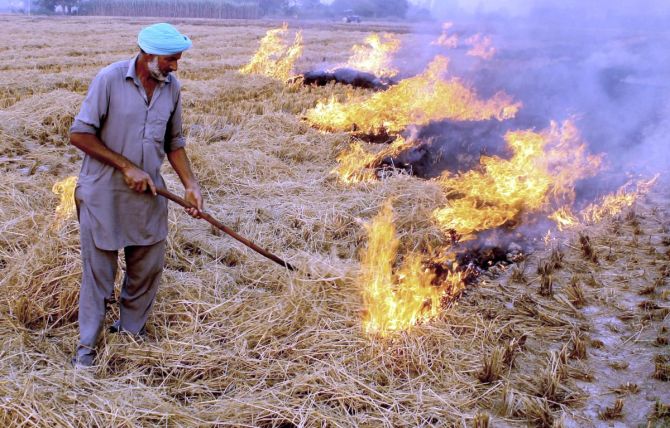New Delhi, October 26
Barely 10 days after appointing Justice Madan B Lokur as a one-man panel to monitor the measures taken by governments of Punjab, Haryana, UP and Delhi to prevent farmers from resorting to stubble-burning, the Supreme Court on Monday put its order in abeyance following a request from the Centre.
A Bench headed by Chief Justice SA Bobde virtually stayed its own October 16 order after Solicitor General Tushar Mehta submitted that the Centre would come out with a comprehensive law on air pollution in three to four days.
Mehta – who had earlier expressed reservations about appointment of the Justice Lokur committee for monitoring measures to prevent stubble-burning – said the legislation was being contemplated to specifically deal with the issue of air pollution in Delhi-NCR.
“It’s good that the government is coming up with a law. This is an issue that anyway should have been looked into…Everyone in this city is choking due to bad air,” the CJI said.
On behalf of PIL petitioner Aditya Dubey, senior counsel Vikas Singh objected to Mehta’s submissions. “I don’t understand the interest of Union of India in getting the order suspended. Ultimately, it is for the benefit of the people of Delhi,” he said.
“We think our own measure should be kept in abeyance. What is your problem? After all you are a PIL petitioner,” the CJI said, posting the matter for further hearing on October 29.
The Supreme Court had on October 16 appointed Justice Lokur as a one-man committee to monitor the measures taken by governments of Punjab, Haryana, UP and Delhi to prevent farmers from resorting to stubble-burning that turns the entire NCR into a virtual gas chamber during October-November.
“It is necessary that there must be some monitoring of stubble-burning with a view to its prevention before it assumes abnormal proportions,” the Bench had said.
It had directed chief secretaries of Punjab, Haryana, UP and Delhi and EPCA to assist the committee in physical surveillance of fields where stubble was likely to be burnt and to devise additional means/methods for preventing it.
“This order is not an indictment of any agency…We are only concerned that people in Delhi-NCR must be able to breathe clean and fresh air…,” the CJI had said.
Solicitor General Mehta had opposed Justice Lokur’s appointment, saying the government had reservations about the move as the Environment Pollution Control Authority (EPCA) appointed by the court was already doing the job.
The court had, however, clarified that appointment of the committee was not intended to dilute the powers and functions of any authorities such as EPCA, already created.
The committee was required to visit the affected states and submit fortnightly reports to the top court at the initial stages or “as and when found necessary”.
The Bench had asked heads of National Cadet Corps, National Service Scheme and Bharat Scouts and Guides to provide young force to the panel for locating stubble-burning and bringing it to notice of authorities concerned to prevent it.
The order had come on a fresh petition filed by two students — Aditya Dubey and Aman Banka — who suggested that Justice Lokur could be assigned the task.
The top court was already seized of a PIL on air pollution in NCR. It has been asking states of Punjab, Haryana, Uttar Pradesh and Delhi and the Centre to take measures to ensure farmers don’t indulge in stubble-burning.
Despite a ban on stubble-burning in Punjab and Haryana, farmers continue to do so because of lack of financial incentives to switch over to environment-friendly farm waste management practices.
Last year, Punjab produced around 20 million tonnes of paddy residue of which farmers burnt 9.8 million tonnes while the figures in Haryana stood at 7 million tonnes and 1.23 million tonnes, respectively.
On October 6, the top court had agreed to examine a suggestion that a portion of Minimum Support Price (MSP) should be withheld from farmers and released later only after a verification that they didn’t burn stubble.


